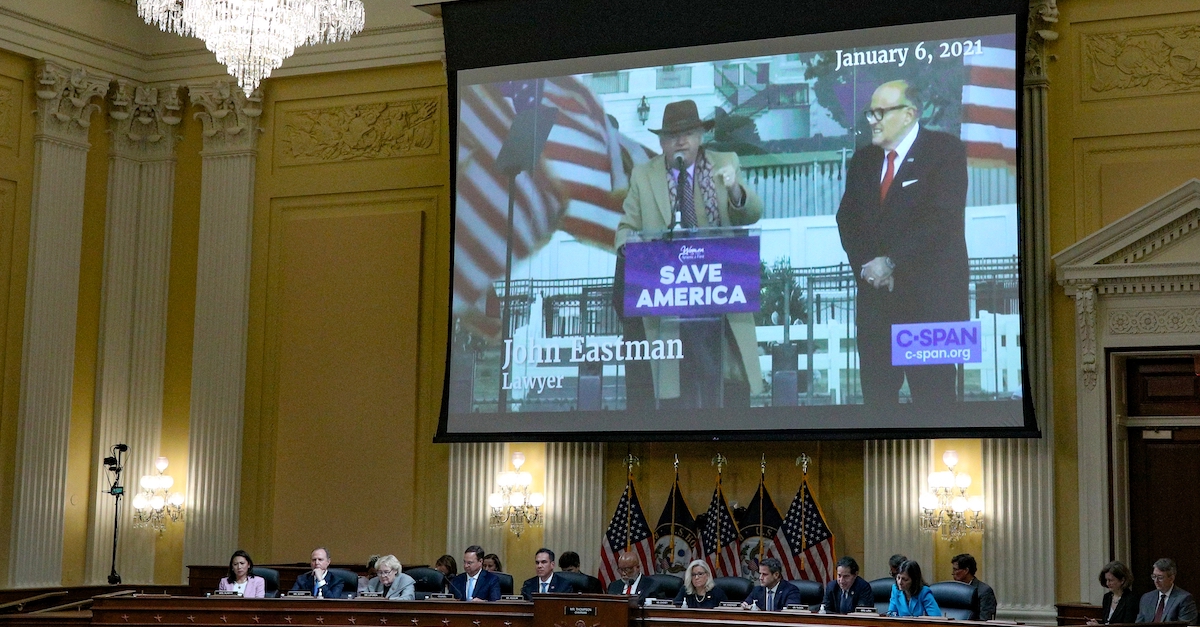
WASHINGTON, DC – JUNE 16: An image of John Eastman and Rudy Giuliani is displayed on a screen during the third hearing held by the Select Committee to Investigate the January 6th Attack on the U.S. Capitol on June 16, 2022 in the Cannon House Office Building in Washington, DC.
In the days after the Jan. 6 attack on the U.S. Capitol, the attorney behind the so-called “coup memo” sent an email to Donald Trump attorney Rudy Giuliani, announcing that he should get a presidential pardon.
“I’ve decided that I should be on the pardon list, if that is still in the works,” John Eastman blithely told Giuliani in the written message, dated days after a Jan. 7 conversation between Eastman and former White House attorney Eric Herschmann.
The email was revealed Thursday during the third day of public hearings before the House Select Committee to Investigate the Jan. 6 Attack on the U.S. Capitol.
“Are you out of your effing mind?” Herschmann recalled telling Eastman after the ex-Claremont Institute senior fellow called him on June 7, purportedly with the goal of “preserving something [relating to Georgia] for appeal.”
“I said, ‘I only want to hear two words coming out of your mouth from now on: orderly transition,'” Herschmann said he told Eastman. “I said, ‘I don’t want to hear any other effing words coming out of your mouth no matter what. Repeat those words for me.”
Eastman is the Trump ally and lawyer who penned what had been dubbed the “coup memo,” a six-step plan to overturn Joe Biden‘s win in the 2020 presidential election. As the committee hearings have revealed, several people close to Trump told him that Eastman’s theory was not supported by law. Eastman himself acknowledged that he would lose 9-0 before the Supreme Court, Mike Pence’s lawyer Greg Jacob told the Committee.
Herschmann testified that he gave Eastman unprompted legal advice.
“Get a great effing criminal defense lawyer,” Herschmann recounted. “‘You’re going to need it.’ And then I hung up on him.”
Eastman emailed Giuliani days later, Rep. Pete Aguilar (D-Calif.) said at Thursday’s committee hearing.
“Dr. Eastman did not receive his presidential pardon,” Aguilar noted. He then ran a compilation tape from Eastman’s deposition before the Jan. 6 committee, in which Eastman apparently invoked his Fifth Amendment right against self-incrimination more than 100 times.
“A Coup in Search of a Legal Theory”
While it’s unclear whether Herschmann’s advice spurred Eastman to hire a lawyer, his decision to refuse to answer questions from the Jan. 6 committee may stem from a ruling in the very lawsuit he filed against the committee in an effort to avoid testifying.
In that ruling, which allowed the committee to access more than 100 communications Eastman claimed were privileged, U.S. District Judge David O. Carter said that it was “more likely than not” that Trump tried to “corruptly” overturn the results of the 2020 presidential election. Carter found that Trump and Eastman “likely” violated two federal statutes: obstruction of an official proceeding and conspiracy to defraud the United States.
“The illegality of the plan was obvious,” Carter, a Bill Clinton appointee, wrote in a scathing 44-page order. “Our nation was founded on the peaceful transition of power, epitomized by George Washington laying down his sword to make way for democratic elections. Ignoring this history, President Trump vigorously campaigned for the Vice President to single-handedly determine the results of the 2020 election. As Vice President Pence stated, ‘no Vice President in American history has ever asserted such authority.’ Every American—and certainly the President of the United States—knows that in a democracy, leaders are elected, not installed. With a plan this ‘BOLD,’ President Trump knowingly tried to subvert this fundamental principle.”
Carter zeroed in on Eastman’s efforts as well, linking them directly to the former president.
“Dr. Eastman and President Trump launched a campaign to overturn a democratic election, an action unprecedented in American history,” Carter wrote. “Their campaign was not confined to the ivory tower—it was a coup in search of a legal theory. The plan spurred violent attacks on the seat of our nation’s government, led to the deaths of several law enforcement officers, and deepened public distrust in our political process.”
“The Public Is Still Searching for Accountability”
While Carter acknowledged that he wasn’t the ultimate arbiter of whether Trump and Eastman committed a crime, it was important to get to the bottom of that question.
“More than a year after the attack on our Capitol, the public is still searching for accountability,” Carter wrote. “This case cannot provide it. The Court is tasked only with deciding a dispute over a handful of emails. This is not a criminal prosecution; this is not even a civil liability suit. At most, this case is a warning about the dangers of ‘legal theories’ gone wrong, the powerful abusing public platforms, and desperation to win at all costs.”
The stakes, Carter said, could not have been higher.
“If Dr. Eastman and President Trump’s plan had worked, it would have permanently ended the peaceful transition of power, undermining American democracy and the Constitution,” Carter wrote. “If the country does not commit to investigating and pursuing accountability for those responsible, the Court fears January 6 will repeat itself.”
It perhaps wasn’t entirely unreasonable for Eastman to request — or even hope for — a pardon from the outgoing president. Trump had issued several pardons already to some of his closest allies, including former Lt. Gen. Michael Flynn and advisor Roger Stone, convicted of lying to federal investigators in connection with the investigation into Russian meddling in the 2016 presidential election.
Trump had also pardoned Charles Kushner, father of the former president’s son-in-law Jared Kushner, who told the Jan. 6 committee that during the days and weeks leading up to Jan. 6 he was, perhaps ironically, largely focused on coordinating presidential pardons.
An attorney for Eastman did not immediately respond to Law&Crime’s email requesting comment.
(Photo by Tom Brenner-Pool/Getty Images)